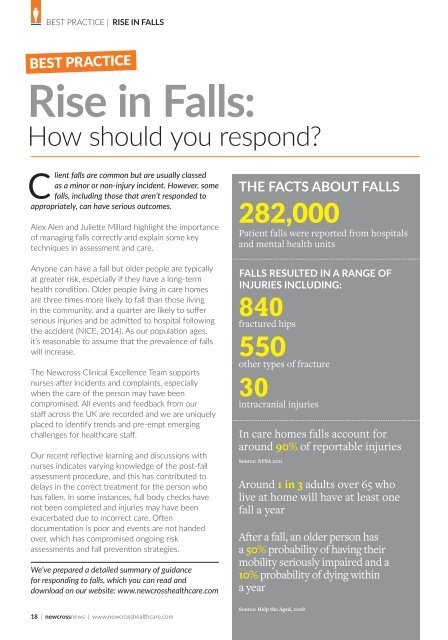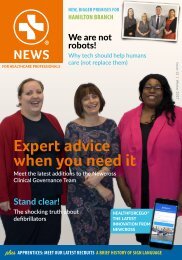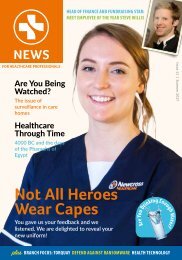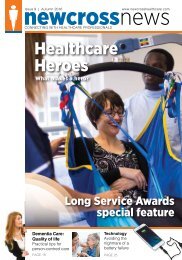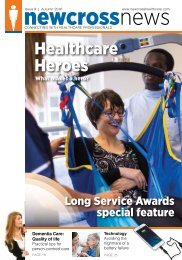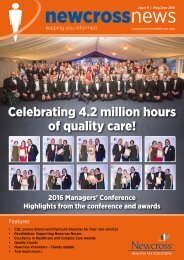Newcross News Issue 10
Create successful ePaper yourself
Turn your PDF publications into a flip-book with our unique Google optimized e-Paper software.
BEST PRACTICE | RISE IN FALLS<br />
BEST PRACTICE<br />
Rise in Falls:<br />
How should you respond?<br />
Client falls are common but are usually classed<br />
as a minor or non-injury incident. However, some<br />
falls, including those that aren’t responded to<br />
appropriately, can have serious outcomes.<br />
Alex Alen and Juliette Millard highlight the importance<br />
of managing falls correctly and explain some key<br />
techniques in assessment and care.<br />
Anyone can have a fall but older people are typically<br />
at greater risk, especially if they have a long-term<br />
health condition. Older people living in care homes<br />
are three times more likely to fall than those living<br />
in the community, and a quarter are likely to suffer<br />
serious injuries and be admitted to hospital following<br />
the accident (NICE, 2014). As our population ages,<br />
it’s reasonable to assume that the prevalence of falls<br />
will increase.<br />
The <strong>Newcross</strong> Clinical Excellence Team supports<br />
nurses after incidents and complaints, especially<br />
when the care of the person may have been<br />
compromised. All events and feedback from our<br />
staff across the UK are recorded and we are uniquely<br />
placed to identify trends and pre-empt emerging<br />
challenges for healthcare staff.<br />
Our recent reflective learning and discussions with<br />
nurses indicates varying knowledge of the post-fall<br />
assessment procedure, and this has contributed to<br />
delays in the correct treatment for the person who<br />
has fallen. In some instances, full body checks have<br />
not been completed and injuries may have been<br />
exacerbated due to incorrect care. Often<br />
documentation is poor and events are not handed<br />
over, which has compromised ongoing risk<br />
assessments and fall prevention strategies.<br />
We’ve prepared a detailed summary of guidance<br />
for responding to falls, which you can read and<br />
download on our website: www.newcrosshealthcare.com<br />
THE FACTS ABOUT FALLS<br />
282,000<br />
Patient falls were reported from hospitals<br />
and mental health units<br />
FALLS RESULTED IN A RANGE OF<br />
INJURIES INCLUDING:<br />
840<br />
fractured hips<br />
550<br />
other types of fracture<br />
30<br />
intracranial injuries<br />
In care homes falls account for<br />
around 90% of reportable injuries<br />
Source: NPSA 2011<br />
Around 1 in 3 adults over 65 who<br />
live at home will have at least one<br />
fall a year<br />
After a fall, an older person has<br />
a 50% probability of having their<br />
mobility seriously impaired and a<br />
<strong>10</strong>% probability of dying within<br />
a year<br />
18 | newcrossnews | www.newcrosshealthcare.com<br />
Source: Help the Aged, 2008


